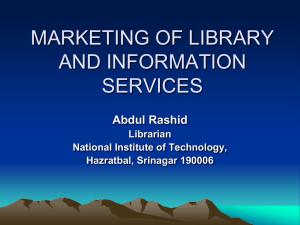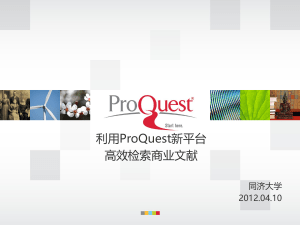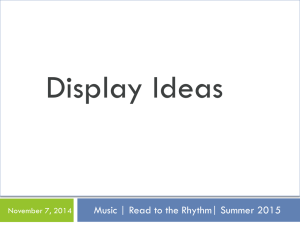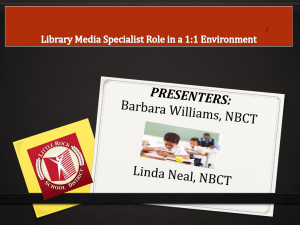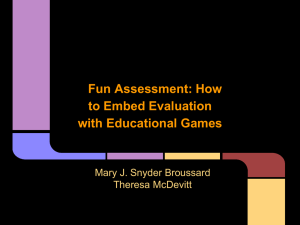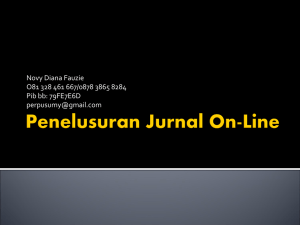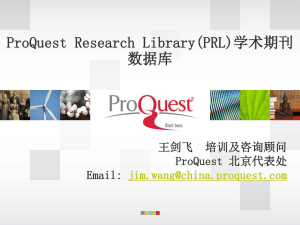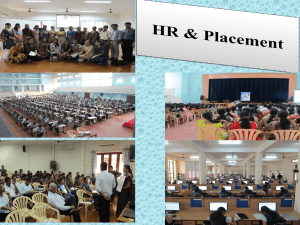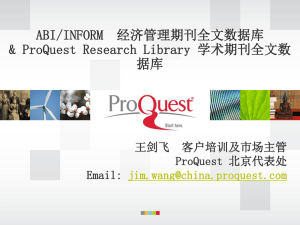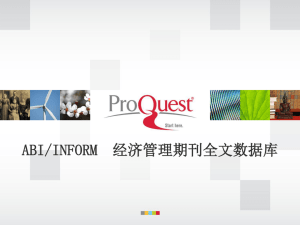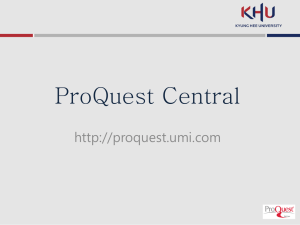ProQuest - HKU Libraries
advertisement
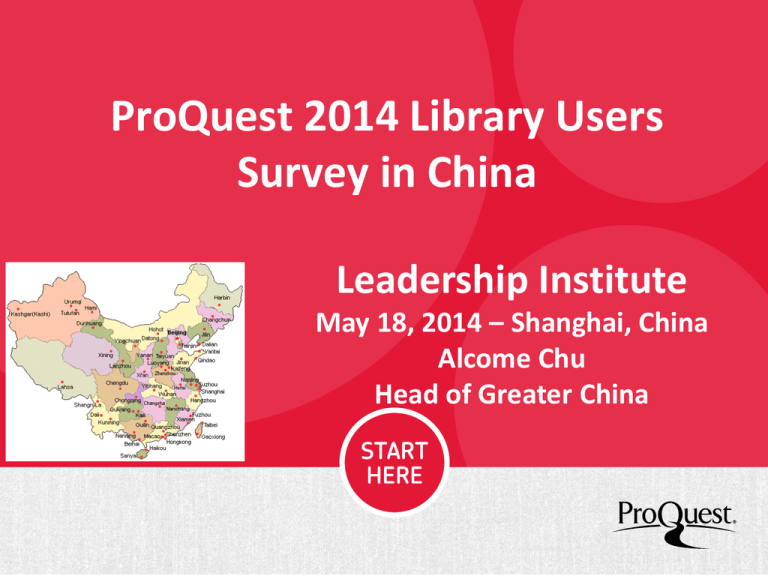
ProQuest 2014 Library Users Survey in China Leadership Institute May 18, 2014 – Shanghai, China Alcome Chu Head of Greater China Research Methodology Thank you – CALIS and all the participants Quantitative electronic survey Number of institutions: 318 Number of Respondents: 2,049 Survey Period: Mid April, 2014 Demographic Breakdown Faculty N=246 Librarian N=689 IT System, 11.89% Cataloging, 6.17% Reference, 38.18% Managem ent, 12.78% Student N=1,366 Others, 13.21% Acquisitio n, 17.77% Research Areas Information Required Faculty Media vs Student Print Vs Digital Obtain Information Categories of Information Most Frequently Desired: Education & Training News Scientific, Technical &… Market Research Report Librarian Faculty IT Research Report Student Legal, Tax & Regulation Hospital & Clinical Human Resources 0% 20% 40% 60% 80% 100% Research Areas Information Required Faculty Media vs Student Print Vs Digital Obtain Information Major Considerations in Obtaining Information: Trustworthy and valued information Access to information not available eleswhere Notifies me for important news or events Librarian Save me time Faculty Student Available on a mobile device Able to share in workgroup 0% 20% 40% 60% 80% 100% Research Areas Information Required Faculty Media vs Student Print Vs Digital Obtain Information Major Obstacles in Obtaining Information: Hard to determine the quality and… Full text is not available Lack of analytic tools Insufficient search capability Information is not updated enough Librarian Insufficient training on how to search… Faculty Hard to know what is available in home… Student Not enough time Too hard to access and use once I find it Multimedia content is not available Lack of support from librarian 0% 10% 20% 30% 40% 50% 60% 70% Major Obstacles in Obtaining Information: “Full text is not available” 60.00% 55.46% 50.00% 38.44% 40.00% 30.00% 20.00% 10.00% 0.00% Faculty Student Major Obstacles in Obtaining Information: “Insufficient training on how to search for information” 35.00% 31.15% 30.00% 25.00% 24.79% 20.00% 15.00% 10.00% 5.00% 0.00% Faculty Student Major Obstacles in Obtaining Information: “Hard to know what is available in library” 35.00% 31.15% 30.00% 25.00% 20.00% 19.75% 15.00% 10.00% 5.00% 0.00% Faculty Student Major channels to obtain information: Resources purchased by my library Free digital resources online InterLibrary Loan System / Document Delivery Service Online bookstore Physical bookstore The resources provided by my library meet my demand for study and research. Strongly Agree Agree Neutral Librarian Faculty Disagree Student Strongly Disagree 0% 5% 10% 15% 20% 25% 30% 35% 40% 45% 50% Research Areas Information Required Faculty Media vs Student Print Vs Digital Obtain Information Benefits of using ebooks: Don't have to carry around heavy print books Accessible on mobile device Convenient to search within an ebook Accessible when there is internet connection It is less expensive than print book Librarian Interactive/ multimedia materials make the content… Faculty Student Not sure since I have not used ebooks often 0% 20% 40% 60% 80% 100% Disadvantages of using ebooks: Less convenient to take notes and annotations Less convenient to use Difficult to search for ditigal materials Librarian Faculty Student Not enough digital materials Devices are too expensive 0% 10% 20% 30% 40% 50% 60% 70% 80% 90% 100% Disadvantages of using ebooks: “Less convenient to use” For books: v s I prefer to use ebooks rather than printed books I expect to use ebooks instead of printed books within the next two years Librarian Faculty Student I recommend open educational resources and adopted ebook 0% 10% 20% 30% 40% 50% 60% 70% 80% 90% For Journals: v s Digital content should be available at a lower cost than print My home library has a good range of digital materials I prefer to use digital materials over print, where available Librarian Faculty Student I trust print materials more than digital materials It's more difficulte to find digital materials than print materials 0% 10% 20% 30% 40% 50% 60% 70% 80% For Journals: “Digital content should be available at a lower cost than print.” 80.00% 70.00% 69.33% 58.74% 60.00% 50.00% 40.00% 30.00% 20.00% 10.00% 0.00% Faculty Student For Journals: “I prefer to use digital materials over print, where available.” 30.00% 28.57% 25.00% 20.00% 13.92% 15.00% 10.00% 5.00% 0.00% Faculty Student When Purchasing Printed Materials: Buy a new copy Buy a new copy only when a used one is not available Librarian Faculty Buy a used one Student I do not / will not buy printed version 0% 10% 20% 30% 40% 50% 60% 70% 80% Research Areas Information Required Faculty Media vs Student Print Vs Digital Obtain Information Hardware for Obtaining Information: 94.69 % 53.93 % 27.27 % 51.25 % Operating System for Obtaining Digital Materials: Andr oid Apple IOS Micros oft Android is more popular than Apple IOS Categories of Apps to download in the next six months: Apps for learning and education Apps for networking (Line, WeChat) Librarian Faculty Student Apps for communicating (email, texting) 0% 20% 40% 60% 80% 100% Research Areas Information Required Faculty Media vs Student Print Vs Digital Obtain Information Common Comments … Verbatim Foreign language resources, especially advanced research materials Dissertations from top universities worldwide. Master student, Xi’an Faculty, Wuhan Provide more training on searching and using library resources. Develop better online platforms for library catalog search Librarian , Beijing Undergraduate, Harbin Takeaway Digital resource is more appreciated than print resources for being more portable, accessible and searchable. This is especially appealing for faculties compared to students. Our respondents are expecting more for the resources provided by their library: - More training on how to search - More digital resources How We Do It Why Choose ProQuest? ProQuest Aggregation: The ultimate and most diverse research collections Keystone scholarly journals in full text Breadth of content types that researchers need – including data, e-books, dissertations, news, video, market reports, trade publications and more Full coverage - from the deepest backfiles to the latest working papers All subjects covered for increasingly interdisciplinary research Researcher tools including scholar profiles and citation management Focused abstract and index database – to avoid any missed or late finds Why Choose ProQuest? ebrary and EBL: ebook pioneers providing the largest selection under the most flexible models and workflow • 500K+ scholarly titles in all subjects • 400K+ eligible for DDA • 600+ publishers • Subscription, Demand-driven Acquisition, Perpetual Archive, Consortia models • Unlimited user, three-user, single user, Non-Linear™ Lending, Extended Access™ • Online and offline access with dedicated apps • Integration with your vendors • Detailed usage statistics • Titles Matching Fast (TMF) Why Choose ProQuest? ProQuest Dissertations & Theses: Partnering with universities to preserve, aggregate and distribute scholarly content since 1939 • 250M digital pages supporting over 200M searches per year • Easy discovery in central repository • Database includes all Ivy League institutions • Official offsite repository for the U.S. Library of Congress • New PQDT Global includes the UK’s Russell Group • Ability to disseminate grad works to 3000 institutions world wide • Metrics define graduate output and impact on faculty research Why Choose ProQuest? ProQuest Summon Service: Pioneer of modern discovery in libraries • Starting point for users to search the entire library • Trusted by 700+ libraries in 40+ countries • Based on a unified index of over 1B records • Relevance ranking algorithms applied equally across index – no bias • Powerful navigation and contextual guidance features • Customizable interface and full featured API • Best Bet and database recommendations • Indexed subject guides and integrated chat • Google-like search box makes discovery easy • Guides users through the research process Why Choose ProQuest? ProQuest News Collection: The definitive collection of news from around the globe - from 1764 to today • 3,000+ print and web resources aggregated every day • Unique access to major titles • ProQuest Historical Newspapers: The New York Times, The Wall Street Journal, The Guardian, Los Angeles Times, Jerusalem Post, Chicago Tribune, Christian Science Monitor, The Globe and Mail, and The Times of India • Specialty collections: Chinese and Black historical newspapers and American Jewish Newspapers NEW • SCMP

